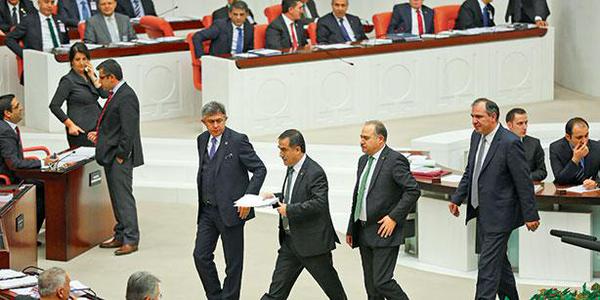A warning from Kurdish militants that negotiations with Turkey
could be on the verge of collapse has turned parliament into the key
battleground in a peace process meant to end a three-decade insurgency. The Kurdistan Workers Party (PKK) warned from their base in northern Iraq's Qandil mountains on Tuesday that Turkey must take concrete steps to advance the process, piling on the pressure ahead of a general election in June. The signs from parliament overnight were not promising. Punches
flew as deputies debated controversial legislation to boost police
powers, legislation which the pro-Kurdish Peoples' Democratic Party
(HDP) - a key player in the peace negotiations - said would legitimize
what it called "state terror". Hopes
had been running high that PKK leader Abdullah Ocalan, jailed on the
island of Imrali in the Marmara Sea, would call an end to an insurgency
that has killed 40,000 people and stunted development in Turkey's mainly
Kurdish southeast. "The
package destroys not just the peace process but all the peace dynamics
in society. This is a bid to crush opposition," said Selahattin
Demirtas, joint leader of the HDP, whose deputies shuttle between Imrali
and Qandil in pursuit of a deal. Speaking
to reporters before the brawl, in which five opposition MPs were hurt,
he riled Prime Minister Ahmet Davutoglu by saying "the government has
homework to do" and accusing it of suppressing details of Ocalan's peace
plans. "Nobody can give the government homework," Davutoglu shot back, warning against efforts to block the legislation. "If
they are going to take a filibustering stance, we will not allow
parliament to be jammed up and will not bow down to threats," he said
during a visit to Pakistan. President
Tayyip Erdogan, who has boosted Kurdish cultural rights in more than a
decade in power, began peace talks with Ocalan in 2012, risking
nationalist wrath. Winning
a disarmament pledge from the PKK could boost chances that the AK Party
he founded wins enough of a majority in the June election to facilitate
his plans to change the constitution and create a stronger presidency. "The
government is insisting on getting a guarantee on disarmament so that
it can go into the election solidly, saying 'we have stopped the
mothers' tears, we are close to peace'," political commentator Cengiz
Candar told Reuters. "DRAG TURKEY INTO DARKNESS" Davutoglu
said Ankara had the right to expect a PKK pledge to renounce armed
struggle. But the PKK's reaction to the bill on police powers, which it
termed "fascist" legislation, has clouded prospects of such a deal. "It
is clear that a mentality so closed to democracy, peace and
negotiations will take no steps on Turkey's democratization and solving
the Kurdish problem," the PKK said in its statement. The
bill boosts police powers to search people and property and increases
penalties for carrying petrol bombs, slingshots and fireworks - all
commonly used in Kurdish protests. Anyone hiding their face with
headscarves at militant protests will face up to five years in jail. "This package, which will drag Turkey
into darkness, must be withdrawn immediately," HDP deputy Pervin Buldan,
a member of the delegation that visits Ocalan, told a news conference. The AKP has a strong parliamentary majority and Erdogan has signaled there will be no backing down. "It
is not a process of bargaining or give-and-take. The peace process is
not about giving concessions. We will not allow any step which would
hurt the memories of our martyrs," he said in a speech addressing
nationalist concerns. Davutoglu
has defended the legislation as necessary after Kurdish unrest in which
dozens died last October, sparked by anger over Turkey's reluctance to
intervene against Islamic State militants besieging the Syrian Kurdish
town of Kobani. That
violence was seen by some observers as evidence that the PKK, despite
the peace overtures, was seeking to consolidate its power in
southeastern towns. The group launched a separatist armed struggle in
1984 before moderating its goal to boosting rights of Turkey's roughly
12 million Kurds. "By
putting its resistance to the package to the fore, Qandil has shown it
has no intention of giving up the initiative it seized in urban
centers," political commentator Rusen Cakir wrote in the Haberturk
newspaper. The HDP has
meanwhile submitted its own draft law boosting freedom of expression,
political association and assembly, lifting obstacles to autonomy and
removing a 10 percent threshold of votes before parties can enter
parliament. That threshold
is unlikely to be changed by June and could prevent the HDP from
re-entering parliament. Their absence could hand the AK Party more seats
but leave it isolated in enacting laws related to the peace process. The PKK's role in fighting Islamic State militants in Syria and Iraq has also dimmed prospects of full disarmament by a group designated a terrorist organization by Turkey, the United States and European Union.
Turkish parliament becomes battleground for Kurdish peace process

Reuters















Comments About This Article
Please fill the fields below.